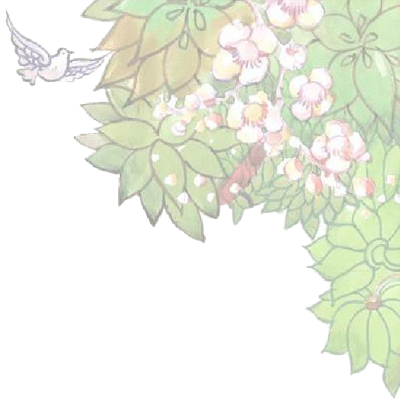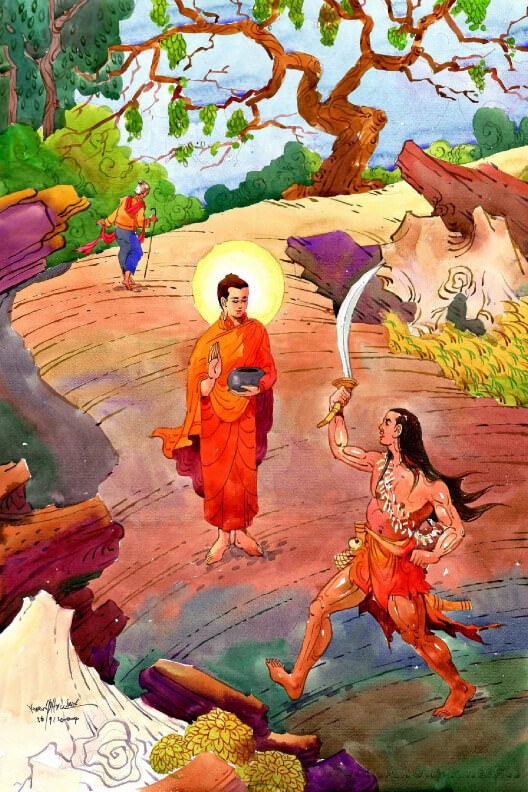53話 アングリマーラ ・・・・ 指を花飾りにした殺人鬼

第5部 さまざまな「悪」ブッダをめぐる人々
第1章 殺人事件
53話 アングリマーラ ・・・・ 指を花飾りにした殺人鬼

ある夜サーヴァッティ(舎衛城)で、奇妙な現象が市内中に発生した。あらゆる武器が震動して、閃光(せんこう)を発して輝いたのだ。全市民がふるえ上がった。これは何の前兆か、と訝(いぶか)しく思った。同様なことは王宮でも発生して、パセーナディ王の眠りをかき乱した。真夜中に王が目覚めると、寝台の端に置いていた縁起物の武器が、まばゆい光を放っていたのである。
その夜、コーサラ国の王師であるバッガワー・バラモンの家では、妻のマンターニーが男の子を出産した。バッガワーは息子の天宮図を作って占星術で運勢を占った。だが、驚愕狼狽したことには、男の子は「盗賊の星座」の下に生まれたことがわかったのである。なんと男の子は、生まれつきの犯罪者であることを示していた。
バッガワーが翌朝、王宮に到着したとき、パセーナディ王は昨夜起きたことを話し、何か王自身に危険があるかどうか、きいた。バッガワーは、心配には及ばない、と答えた。息子が生まれて以来の事情を伝え、それが原因で武器が震動し、閃光を発して輝いた、と語った。そこで、王は王師に、こうきいた。
「そやつは単独の追いはぎになるのか、それとも群盗の首領か?」
「陛下、あの子は一匹狼の賊になるでありましょう。しかし未来の災難防止のため、あの子を殺しましょうか?」
「バッガワーよ、そやつが一匹狼の賊になる限り、生かして、まともな教育を受けさせよ。そうすれば、そやつは悪事に向かわないかも知れぬ」
男の子が将来どんな禍(わざわい)も引き起こさず、慈悲深い人間に育つことを期待して「不害」を意味するアヒンサカと名づけた。かれは行儀のよい、賢いこどもに育った。肉体も頑健だった。そして高等教育を受ける必要が生じたとき、父はかれを学芸都市タッカシラーへ送り、学識ある著名な教師のもとで学ばせた。
アヒンサカは勤勉で優秀な学生だった。猛勉強して、全科目でクラスメートをしのぎ、優等賞をたくさんもらった。先生に献身的に、謙虚に仕え、ほどなく先生一家と、きわめて親しくなった。かれらの温かい関係が同級生たちの嫉妬を招いた。同級生たちはアヒンサカを貶(おとし)めようとした。何度も告げ口して、それに失敗してから、かれらは三つのグループに分かれ、アヒンサカが先生の奥さんと情を通じている、と咎(とが)め立てた。
第一のグループの学生たちが先生に近寄って行って、こう報告した。
「先生、お宅のことで、よからぬ噂が広まっているのを耳にしました」
「それは何のことだね、学生たちよ?」
「先生、恥ずべきことですが、アヒンサカと先生の奥さまが関係している、と僕らは確信しております」
「出て行け、破廉恥(は れん ち)な者たち! なんということだ、わたしとわが息子の仲を裂こうとするなんて!」
少し後に、第二のグループが先生に、同様の報告をした。そして、さらにつづけて第三のグループが、こう付け加えた。
「もし、僕らを信じないなら、先生ご自身で調べてみてください」
結局のところ、こうしたアヒンサカへの再三の告げ口の後、学生たちは先生の心を毒することに成功した。先生の不信感は、しだいに確信にまでなった。それで先生は、自分の評判が傷つかないような方法で、アヒンサカを殺す、と誓ったのである。アヒンサカが学業を修了したとき、先生はついに復讐するときが来た、と思った。先生はアヒンサカを呼んで、こう言った。
「わが親愛なるアヒンサカよ、一人の学生が学業を修了したとき、先生に敬意をこめた贈り物を贈る、という義務があることを君は知っているかね?」
「はい、先生。でも、どんな種類の贈り物を先生に差し上げるべきなのでしょうか?」
「君は、一千の人の指を、わたしに持ってこなければならない。指は、それぞれ一人の人間の右手の指だ」
アヒンサカは先生に、そんな贈り物は人の命を奪うことになるのだから、どうか考え直してください、と何度も訴えた。アヒンサカの育った家庭は、人に害を及ぼすようなことがなく、暴力とは一切、無縁だったからである。だが先生は、それをやることによってのみ、アヒンサカが修めた学業は、儀礼として敬意を払った実りある学問となるだろう、と言ったのである。ほかに選択肢がなく、先生をがっかりさせたくなかったので、アヒンサカはとうとう承諾した。先生に礼をした後、ひと組の武器を受けとり、コーサラ国のジャーリニーの森へ向かった。
アヒンサカはその地で、高い崖の上に住んだが、そこからは下の街道を監視できた。旅の者がその街道を通り過ぎるたび、隠れ家から駆け降り、殺害し、犠牲者の指を一本、切断した。最初のころは切った指を木に掛けておいた。だが、そうすると、鳥たちが指を咥え、肉を喰らい、骨を落とした。アヒンサカが集めた多くの指が地上で腐っているのに、かれは気づいた。かれは、もっと多くの指を集めるしかなかった。とうとう指の骨で花飾りをつくり、首に掛けた。それ以降、かれはアングリマーラ、「指の花飾り」(指鬘)として知られるようになった。
そのうちに誰も街道を、あえて独りでは通らなくなった。十人、二十人、三十人、いや四十人もの集団になって移動した。しかしながら、めったにアングリマーラの血塗られた手から逃れることはなかった。もはや、誰もあえてそこに行かず、街道はさびれていった。そこでアングリマーラは村のはずれまで近づき、通り過ぎる人間に襲いかからざるを得なくなった。夜間、民家に押し入り、住人を殺し、かれらの指を切断、ひもに通して自分の首飾りとして掛けるまでになった。当然のなりゆきから、人びとは家を捨てた。村々は荒れ果てた。異様な恐怖が地域全体に暗い影を落とした。
家をなくした村人たちはサーヴァッティへ向かい、王宮に集まり、泣いて、嘆き悲しんだ。かれらは王に窮状を訴えた。パセーナディ王はただちに、盗賊アングリマーラを捕獲せよ、と分遣隊の兵士たちに命じた。王の決意を伝え聞いたアングリマーラの母マンターニーは、夫のもとへ行って、こういった。
「親愛なるわが夫よ、悪名高い盗賊はわたしたちの息子だ、とわたしは信じております! そしていま、王は配下の者に命じて、あの子を捕らえるように命令したのです」
「わたしは何をすべきなのかな?」と、バラモンの夫がきいた。
「どうぞ、あなたが行って、あの子を見つけてくださいな! あの子を説得して、武器を置いて、わが家に連れて帰ってくださいな! さもないと、あの子を王が殺してしまいますもの」と、マンターニーはかきくどいた。
だが、バラモンは、こう答えた。
「ああ、お前、わしはそうはしないよ。王はあの子を、なさりたいようにされるであろう」
しかしながら母親の思いは、こわばった父親の心とちがって柔らかいものであった。自分の息子への愛情から、彼女は、アングリマーラが隠れている、と報告されている森へひとりで出発した。彼女は、息子に警告し、息子を救い、悪の道を捨てるように、と懇願し、いっしょに連れて帰りたかったのである。
それまでにアングリマーラは九百九十九の指を収集していて、あと一つで千になるのだ。そこでかれは次に最初に出遭った人間を殺して、先生が要求した目標を達成しよう、と決めた。
朝早くに、世尊が偉大な憐れみ(大悲)をもって世界を見渡していたとき、世尊の視野の中にアングリマーラが入った。もし、世尊が介入しないなら、アングリマーラは自分の母親を殺してしまい、このことによって地獄で長期にわたって苦しむであろう、とご覧になられた。そこで、憐れみから、朝の勤めを終えた後、サーヴァッティから三十ヨージャナ(約五百㌔前後)離れた森へ、アングリマーラが忌まわしい犯罪を犯さないように救うため、世尊はひとりで立たれた。
世尊がジャーリニーの森へ向かわれているのを、多くの牛飼い、羊飼い、農夫、旅人らが見た。かれらすべて、世尊がそこへ行くのを止めようとした。しかしながら世尊は、沈黙したまま進んで行かれた。そして、たそがれが迫ってきたとき、アングリマーラは隠れ家から、年老いた女が街道をひとりで歩いているのを見た。かれは急いで駆け降りた。近くまで行くと、女は誰あろう、わが母だとわかった。当初、かれはためらっていた。だが、あと一人で目標に到達するのだ、という思いに突き動かされ、とにかく母を殺そう、と決めた。
突然、アングリマーラはひとりの比丘を見た。誰あろう世尊である。街道を静かに歩み、アングリマーラとかれの母との間を歩いている。かれは、こう考えた。
(なぜ、自分の母親を殺さなきゃならないんだ? あそこに誰か、ほかの奴がいるのに。あの比丘を殺して、指を取ってやろう)
そこでアングリマーラは、剣と盾を持ち、弓と矢筒を装着して、世尊を追いかけた。まさにそのとき、世尊は神通力の離れわざをみせた。アングリマーラがあらん限りの全速力で駆けているのに、世尊には追いつけず、世尊はふだん通りの速さで歩かれているのであった。
アングリマーラは世尊を追いかけて三ヨージャナ(約五十㌔前後)の距離を走ったのに、それでも世尊に追いつけなかった。とうとう力尽きた。立ち止まって、大声で呼びかけた。
「止まれ、比丘よ! 止まれ、比丘よ!」
世尊が答えて、いわれた。
「わたしは止まっている、アングリマーラよ。そなたも止まりなさい!」
アングリマーラは、こう思った。
(釈迦族の子である、こうした比丘たちは、真実を話し、真実を主張するものだ。しかし、この比丘は歩いているのに、それでも『わたしは止まっている、アングリマーラよ。そなたも止まりなさい!』という。この比丘に質問してみたらどうであろうか?)
そこで世尊に偈で、こう問いかけた。
「おまえは歩いているのに、比丘よ、おまえは止まっている、という。
しかし今、わたしが止まったとき、おまえは、わたしが止まっていない、という。
わたしは今、おまえに尋ねる、おお、比丘よ、その意味とは何なのか?
どのようにして、おまえは止まったのか、そして、わたしは止まっていないのか?」
世尊が答えられた。
「アングリマーラよ、わたしは永遠に止まったのだ。
わたしは生けるものへの暴力を放棄した。
しかし、そなたには呼吸するものへの自制がない。
それゆえ、わたしは止まったのであり、そなたは止まっていないのだ」
このような智慧あることばを聴いて、アングリマーラはその意味を思い返し、悪行為を止めることができないので輪廻(サンサーラ)の中でさまよっている、と理解した。そしてアングリマーラは、かれの前に立っている比丘はふつうの比丘ではなく、世尊その方である、とわかったのだ。かれはまた、まさに直感的に、真理の光をかれに見せるために尊師がこの森に来られたのだ、と知ったのである。
それゆえ、かれは武器を手にもち、深い谷の淵へ放り投げた。かれはそれから世尊に近づき、御足に礼拝し、世尊に比丘僧団に入る許しを請うた。世尊は憐れみから、アングリマーラにかけられた「来たれ、比丘よ!」(来見比丘)のことばによって入団戒(具足戒)とされた。この回心後、世尊はアングリマーラを随行の比丘として伴い、ゆっくりと旅路をたどってサーヴァッティへ向かった。最後にジェータヴァナ僧院(祇園精舎)に着き、アングリマーラはそこに住んだ。ブッダの伝道遍歴二十年目のことで、この悪名高い殺人鬼アングリマーラは従順になり、ひとりの聖者に変身したのであった。
さてパセーナディ王は五百人の騎兵を率い、アングリマーラを捕獲するため、ジャーリニーの森へ出発した。それは、きわめて多くの人びとの強い要求を受けた後であった。その途中、王は、世尊に会って敬意を払うためジェータヴァナ僧院に立ち寄った。そのとき、世尊が王に、こう尋ねた。
「大王よ、どうされたのですか? マガダ国のセーニヤ・ビンビサーラ王か、ヴェーサーリーのリッチャヴィ族か、それとも、そのほかの敵対する支配者たちが、あなたを攻撃しているのですか?」
「いいえ、そうではありません、尊師よ。悪名高い殺人鬼がわが王国に出没しているのです。人びとをたくさん殺害し、かれらの指を切断し、その指で花飾りにしているのです。アングリマーラと呼ばれています。しかし、・・・わたしはそいつをやっつけることに、どんなときも成功しないでしょう、尊師よ」
「しかし大王よ、もし万一、アングリマーラが髪と髭を剃って黄衣をまとい、剣を置いて聖なる生活を送っているのをあなたが見るとしたら、どうされますか?」
「そのような場合は、われらはかれに礼拝して、比丘の四資具(訳注:衣・托鉢食・臥坐所・医薬品)を納めるために招待するでありましょう。しかし、尊師よ、どのようにしてかれは、そんな善行と自制を持てるのでしょうか?」
まさにそのとき、世尊は右手を伸ばして、こう言われた。
「大王よ、ここにいるのが、そのアングリマーラです」
パセーナディ王はショックを受け、恐怖に襲われた。身の毛がよだった。しかし世尊は王をなだめ、このように言われた。
「恐れてはなりません、大王よ。恐れることは何もないのです」
王は落ちつきを取り戻すと、アングリマーラ尊者のもとへ行き、父と母の姓を尋ねた。残忍な凶行に由来する名前で比丘に呼びかけるのは適当ではない、と思ったからである。王はまた、これこそ探していた人物である、という確証を得たかったのだ。比丘の父の姓はガッガ、王師で、母はマンターニー、と知って、王は非常に驚いた。まさに今、王は、かれの誕生にまつわる奇妙な現象を思い出した。それから王は、かれに、こう呼びかけ、請いもとめた。
「ガッガ・マンタニープッタ尊者が、衣・托鉢食・臥坐所・医薬品を、わたしからお受けくださいますように」
そのあとパセーナディ王は世尊のもとへ戻り、こう言った。
「すばらしい、尊師よ。ふしぎです、世尊がどのように、不服従の者を服従させ、乱暴な者を平和にし、不穏な者を平静にされたのか。この者は刑罰によっても武器によっても服従させられなかったのに、世尊は刑罰も武器もなしに服従させたのです」
ある日、アングリマーラ尊者がサーヴァッティに托鉢に行ったとき、お産が難産となって苦しんでいる女を見た。憐れみ(慈悲)の思いが心に生じた。そのあと、このことを世尊に報告すると、世尊はかれに、こう諭された。
「アングリマーラよ、その女のもとへ行って、このようにいいなさい。『婦人よ、わたしは(出家比丘になるという)聖なる誕生をして以来、どんな生きとし生けるものの命も、故意に奪った覚えがありません。この真実の発言によって、あなたと、あなたのおなかにいるこどもが、安らかでありますように』と」
かれはただちにサーヴァッティに行った。女の家に着いたとき、かれは世尊に教えられた厳粛な真実の発言をした。そのあとすぐ、女は赤ちゃんを産み、母子ともに健全であった。
そして、それからほどなく、アングリマーラ尊者はひとり離れて住み、怠けることなく、熱心に、着実に、実践に励み、「生まれは尽きた。梵行は完成された。なすべきことはなされた。もはや、この状態のほかにはない」と直接的に知った。アングリマーラ尊者は阿羅漢の一人になったのである。
ある日の朝、アングリマーラ尊者がサーヴァッティで托鉢に歩いていたとき、かつて殺人鬼のアングリマーラが愛する者を殺害したことを、いまだに忘れられない者らが襲ってきた。土のかたまりや小石、土器のかけらを投げつけた。棒でも叩いてきた。かれらの襲撃はまことに容赦なく残忍なもので、アングリマーラが世尊のもとにやっと帰り着くと、大けがをしていた。頭からは血が流れ、鉢はこなごなに割れ、衣はずたずたに破れていた。世尊はかれがやって来るのをご覧になって、こう慰められた。
「耐えなさい、バラモン(聖者)よ! 耐えなさい、バラモンよ! そなたが地獄で何年も、何百年も、何千年も受けねばならない悪業の果報を、そなたは今、この現世で受けているのです」
そのあとすぐ、アングリマーラ尊者は安らかに亡くなった。
※ 画像やテキストの無断使用はご遠慮ください。/ All rights reserved.

Episode 53 Aṅgulimāla, THE FINGER GARLAND
One night in Sāvatthi, a strange phenomenon took place throughout the city. At that time, all weapons were trembling and sparkling; it frightened all the citizens; they wondered about this omen. The same happened in the palace, where King Pasenadi’s sleep was disturbed. He woke up in the middle of the night and saw that his auspicious weapon was lying at the end of his bed, sparkling brightly.
That night, in the house of the brahmin Bhaggava—the royal chaplain of the Kosala Kingdom—his wife Mantāṇī gave birth to a baby boy. Bhaggava cast his son’s horoscope. But to his consternation, he found that the boy was born under the “robber constellation”, indicating that the boy had an innate disposition to a life of crime.
When Bhaggava arrived at the palace in the next morning, King Pasenadi told him about what had happened last night and asked whether there would be any danger to him. Bhaggava replied that the king should not worry. He related the birth of his son, which had caused the weapons to tremble and sparkle. Then, the king asked his royal chaplain: “Will he be a lone robber or leader of a gang?”
“Your Majesty, he will be a lone robber. But, in order to prevent any trouble in the future, should we kill him?”
“Bhaggava, as he will be a loner, let him live and get proper education. By this way, he may not incline to do evil.”
With the expectation that the boy would not cause any harms in the future and would become a merciful person, he was named Ahiṁsaka, which means “Harmless”. He grew up as a well-behaved and intelligent child; he was also physically strong. And when he needed to pursue his higher education, his father sent him to Takkasilā, where he studied under a learned and famous teacher.
Ahiṁsaka was a diligent and brilliant student. Through hard work, he surpassed his classmates in all subjects and gained many honours. He also served his teacher so devotedly and humbly that he soon became quite close with his teacher’s family. Their warm relationship made his fellow students jealous. They tried to disgrace him. Failing many times to calumniate Ahiṁsaka, they split themselves into three groups
and charged him of having a love affair with the teacher’s wife.
The first group of pupils approached the teacher and reported:
“Teacher, we heard some talk around the house.”
“What is it about, my dear pupils?”
“Teacher, this is shameful, but we believe that there is an affair between Ahiṁsaka and your wife.”
“Go away, you miserable lot! How dare you try to cause dissension between me and my son!”
After some time, the second group reported to the teacher in the similar way. And following, the third group added: “If you did not believe us, you may check it by yourself.”
In the end, after these repeated calumnies against Ahiṁsaka, they succeeded in poisoning the teacher’s mind. His suspicion grew into conviction. Then, he swore to kill the boy in a way that would not harm his reputation. When Ahiṁsaka completed his education, the teacher found the right time to take revenge on him. The teacher
called him and said: “My dear Ahiṁsaka, do you know that there is a duty for a pupil who has completed his studies to present a gift of honour to his teacher?”
Ahiṁsaka replied: “Yes, teacher, but what kind of gift that should I present to you?”
“You must bring me a thousand human fingers, one from each person’s right hand.”
Ahiṁsaka pleaded with his teacher several times not to demand that kind of gift which would cause deprivation of human life, for his family was harmless and had never engaged in violence. But, his teacher said that it would be fruitful for him only if he performed the ceremonial homage of the science that he had learned. Seeing no
other choice and not willing to disappoint his teacher, Ahiṁsaka finally consented. After paying respect to his teacher, he took a set of weapons and went to the Jālinī Forest in the State of Kosala.
There, he lived on a high cliff where he could watch the road below. Whenever he saw travellers passing by the road, he would run down from his hideout, kill them and cut off one finger from each of his victims. At first, he hung the fingers on a tree. But then, the birds ate the flesh and dropped the bones. He noticed that many fingers
which he had collected were rotting on the ground. He had but to collect even more fingers. Finally, he made a garland of the finger bones and hung it around his neck. Thenceforward, he was known as Aṅgulimāla, or “The Finger Garland”.
In the course of time, no one dared to pass by the road alone. Now, they moved in groups of ten, twenty, thirty, and even forty. Nevertheless, rarely did they escape from Aṅgulimāla’s bloody hands. No one dared go there, and the road became deserted. Aṅgulimāla now had to approach the outskirts of villages and attack people who passed by. He even went so far as to enter houses at night, killing the inhabitants, cutting off their fingers and threading them to his necklace. In due course, people abandoned their homes; the villages became deserted. Such a great terror clouded the entire district.
Then, the homeless villagers went to Sāvatthi and gathered at the royal palace weeping and lamenting. They told the king of their plight. King Pasenadi immediately ordered a detachment of soldiers to capture the robber Aṅgulimāla. His mother Mantāṇī, who heard the king’s intention, went to his husband and said: “My dear husband, I am sure that notorious robber is our son! And now, the king has ordered
his men to arrest him.” “What should I do?” the brahmin asked.
“Please, dear, go and find him! Persuade him to lay aside his weapon and bring him home! Otherwise, the king will have him killed,” Mantāṇī begged. But the brahmin replied: “My dear, I will not do it. The king may do with him as he likes.” A mother’s heart, however, is soft. And out of love for her son, she set out alone to the forest where Aṅgulimāla was reported to have been hiding. She wanted to warn him and save him, and to beseech him to renounce his evil ways and return with her.
By now, Aṅgulimāla found that he had collected nine hundred and ninety-nine fingers, just one more finger to reach one thousand. So, he determined to kill the first person he met to fulfil the target requested by his hostile teacher.
Early in the morning, when the Blessed One surveyed the world with great compassion, He saw Aṅgulimāla in His vision. He reflected that if He did not intervene, Aṅgulimāla would kill his own mother—for this, he would have to suffer for a long time in the Niraya Hell. So out of compassion, after the morning duty, the Blessed One left alone for the forest, thirty yojanas away from Sāvatthi, to save Aṅgulimāla from conducting a heinous crime.
Many cowherds, shepherds, farmers and wayfarers saw the Blessed One was proceeding to the Jālinī Forest. They all tried to prevent Him from going there. However, He went on in silence. And as dusk was approaching, Aṅgulimāla saw from his hideout an old woman walking along the road alone. He hurried down. As he came closer, he realised that she was none other than his own mother. At first, he was
hesitating. But provoked by the quota which was nearly completed, he decided to kill her anyway.
Suddenly, Aṅgulimāla saw a bhikkhu—none other than the Blessed One—who was walking calmly on the road between him and his mother. He thought: “Why should I kill my mother while there is someone else? I will kill this bhikkhu and cut off his finger.” Then, Aṅgulimāla took up his sword and shield, buckled on his bow and quiver, and went in pursuit of the Blessed One. Just then, the Blessed One performed a feat of supernormal power (iddhi) in such a way that Aṅgulimāla, though running as fast as he could, was unable to catch up with the Blessed One, who was walking at His normal pace.
Though Aṅgulimāla had been running after the Blessed One for three yojanas, yet he failed to overtake Him. Finally, he was exhausted; he stopped and called out: “Stop, bhikkhu! Stop, bhikkhu!”
The Blessed One replied: “I have stopped, Aṅgulimāla. You stop, too!”
Aṅgulimāla thought: “These bhikkhus, sons of the Sākyans, speak the truth and assert the truth; but though this bhikkhu is walking, yet he says: ‘I have stopped, Aṅgulimāla. You stop, too!’ Suppose I question this bhikkhu?”
Then, he addressed the Blessed One in verse:
“While You are walking, bhikkhu, You tell me You have stopped. But now, when I have stopped, You say I have not stopped. I ask You now, O bhikkhu, what is the meaning of it? How is it You have stopped and I have not?”
The Blessed One replied:
“Aṅgulimāla, I have stopped forever;
I abstain from violence towards living beings.
But you have no restraint towards things that breathe.
That is why I have stopped, and you have not.”
On hearing these wise words, Aṅgulimāla reflected the meaning and understood that by such evil deeds he could not stop wandering in saṁsāra. And Aṅgulimāla realised that the bhikkhu standing before him was not an ordinary bhikkhu, but the Blessed One Himself. He also knew intuitively that, indeed, the Master had come to the forest specially to make him see the light of Truth.
Accordingly, he took his weapons and flung them into a chasm’s pit. Then, he approached the Blessed One, worshipped Him at His feet, and asked the Blessed One to admit him into the Order of Bhikkhus. Out of compassion, the Blessed One ordained Aṅgulimāla by the words, “Come, bhikkhu!” After this spiritual conversion, the Blessed One went to Sāvatthi by stages with Aṅgulimāla as His attendant bhikkhu. Finally, they arrived at the Jetavana Monastery, where Aṅgulimāla took residence. It was in the twentieth year of the Buddha’s ministry when this notorious murderer Aṅgulimāla was tamed and transformed into a saint.
Now King Pasenadi, accompanied by five hundred horsemen, set out towards the Jālinī Forest to capture Aṅgulimāla after an intense demand from a great number of people. On the way, he stopped at the Jetavana Monastery to pay respect to the Blessed One. Then, the Blessed One asked him: “What is wrong, great king? Is King Seniya Bimbisāra of Magadha, or the Licchavīs of Vesālī, or some other hostile rulers attacking you?”
“No, it is not so, Lord. A notorious murderer has appeared in my kingdom. He has killed so many people, cut off their fingers and wore them as a necklace. He is called Aṅgulimāla. But, …I shall never succeed in putting him down, Lord.”
“But, great king, if you were to see that Aṅgulimāla had shaved off his hair and beard and put on a yellow robe, and that he had laid aside his sword and led a holy life, what would you do?”
“In that case, we would pay homage to him and we would invite him to accept the four requisites of a bhikkhu. But, Lord, how could he have such virtue and restraint?”
Just then, the Blessed One extended His right arm, and said: “Great king, here is Aṅgulimāla.”
King Pasenadi was shocked and fearful. His hair stood on end. But, the Blessed One calmed him down, saying: “Do not be afraid, great king. There is nothing for you to fear.”
When the king had regained his composure, he went over to the Venerable Aṅgulimāla and asked him for the family name of his father and mother, thinking that it was unsuitable to address the bhikkhu by the name that was derived from his cruel deeds. He also wanted to make sure that this was the person he was looking for. The king was greatly surprised to know that his father was a Gagga, his royal chaplain, and his mother was a Mantāṇī; now, the king remembered the strange phenomenon of his birth. Then, the king addressed and invited him:
“May the Venerable Gagga-Mantāṇiputta accept my support of robes, alms-food, lodging and medicine.”
Afterwards, King Pasenadi returned to the Blessed One and said: “It is wonderful, Lord, it is marvelous how the Blessed One subdues the unsubdued, pacifies the unpeaceful, calms the uncalm. This one, whom we could not subdue with punishments and weapons, the Blessed One had subdued without punishments or weapons.”
One day, when the Venerable Aṅgulimāla went to Sāvatthi for alms, he saw a certain woman who was having much difficulty in bringing forth her child. Compassion aroused in him; afterwards, he reported this to the Blessed One, who advised him: “Aṅgulimāla, go to that woman and say: ‘Sister, since I was born with the noble birth, I do not remember intentionally taking the life of any being. By this utterance of truth, may there be comfort to you and to the child in your womb.’” He
immediately went to Sāvatthi. When he arrived at the woman’s house, he made the asseveration of truth as instructed by the Blessed One. Soon after that, the woman delivered a baby, and both are safe.
And before long, dwelling alone, withdrawn, diligent, ardent and resolute in the practice, the Venerable Aṅgulimāla knew directly:
“Birth is exhausted, the holy life has been lived out, what has to be done has been done, there is no more of this to come.” And the Venerable Aṅgulimāla became one of the Arahants.
One morning, when the Venerable Aṅgulimāla walked for alms in Sāvatthi, he was attacked by some people who still could not forget that the murderous Aṅgulimāla was responsible for the deaths of their beloved ones. They threw him clods of earth, stones and potsherds;
they also struck him with sticks. Their assault had been quite brutal, for Aṅgulimāla returned to the Blessed One seriously injured, with blood flowing from his head, his bowl broken in pieces, and his outer robe torn. Seeing him coming, the Blessed One consoled him: “Bear it, brahmin! Bear it, brahmin! You are experiencing here and now the result of deeds on account of which you might have been tortured in hell for many years, for many hundred years, for many thousand years.” Soon afterwards, the Venerable Aṅgulimāla passed away peacefully.
※ 画像やテキストの無断使用はご遠慮ください。/ All rights reserved.
アシン・クサラダンマ長老
1966年11月21日、インドネシア中部のジャワ州テマングン生まれ。中国系インドネシア人。テマングンは近くに3000メートル級の山々が聳え、山々に囲まれた小さな町。世界遺産のボロブドゥール寺院やディエン高原など観光地にも2,3時間で行ける比較的涼しい土地という。インドネシア・バンドゥンのパラヤンガン大学経済学部(経営学専攻)卒業後、首都ジャカルタのプラセトエイヤ・モレヤ経済ビジネス・スクールで財政学を修め、修士号を取得して卒業後、2年弱、民間企業勤務。1998年インドネシア・テーラワーダ(上座)仏教サンガで沙弥出家し、見習い僧に。詳しく見る
奥田 昭則
1949年徳島県生まれ。日本テーラワーダ仏教協会会員。東京大学仏文科卒。毎日新聞記者として奈良、広島、神戸の各支局、大阪本社の社会部、学芸部、神戸支局編集委員などを経て大阪本社編集局編集委員。1982年の1年間米国の地方紙で研修遊学。2017年ミャンマーに渡り、比丘出家。詳しく見る

※ 画像やテキストの無断使用はご遠慮ください。
All rights reserved.

